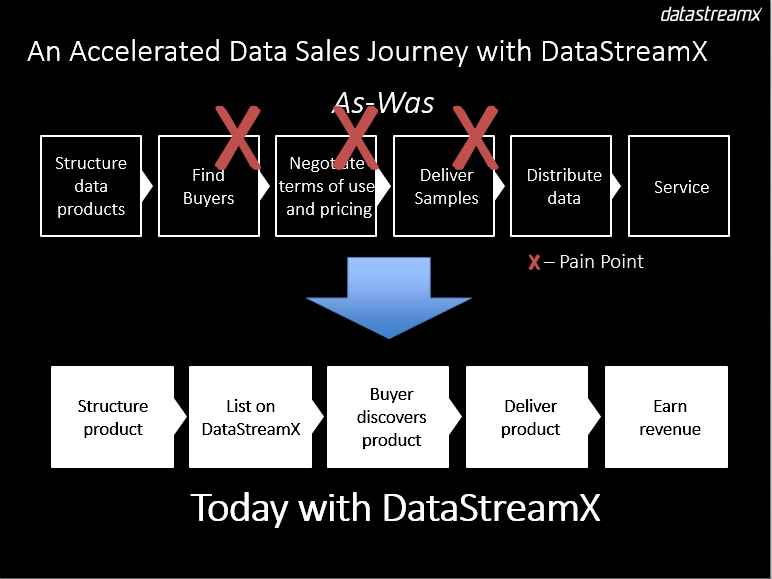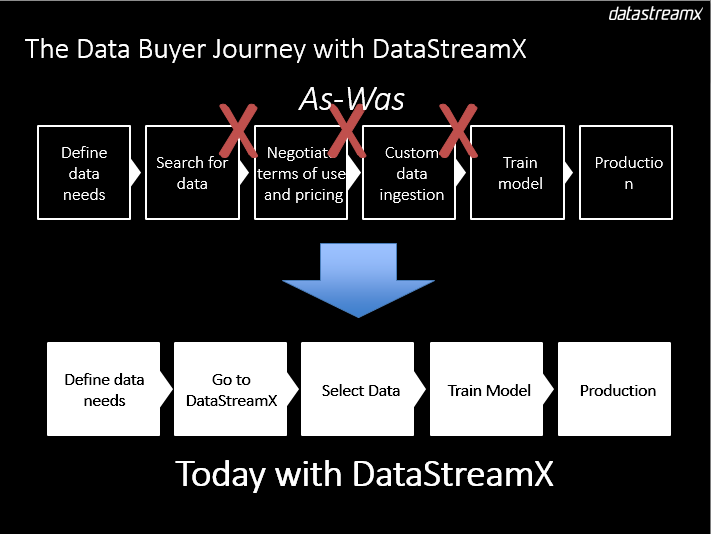Working in business development at DataStreamX, I have a frontline perspective of hunches, beliefs, and suspicions about what our data marketplace represents to buyers and vendors. What I find interesting is the broad variance in the feedback I receive, differing by location, industry, role and experience in the data economy. Because of this variance, I find it prudent to firmly address what the DataStreamX marketplace is, and isn't.
So. What is a data marketplace anyway?

1. The data marketplace is not a data broker
A data marketplace should not be confused with a data broker. A data marketplace is an online, open, fluid arena where third-party data vendors list data products (sometimes raw, sometimes processed) for sale to a diverse buyer community. A data market place exists to democratize access to useful data globally, while providing the monetary incentive for vendors to do so.
A data broker, on the other hand, typically collects and aggregates personal or consumer information and sells that data to other organizations. The data is typically used to advertise and market towards specific groups, verify identity, and to research particular individuals. Data brokers typically trade in personal information and targeting.
These definitions highlight just a snippet of the intractable differences between a data marketplace and data broker. Or, more directly stated, DataStreamX is not a data broker. DataStreamX is a steward of the global data economy.
2. Data vendors reach new segments and geographies with the data marketplace
By its digital nature, data flattens the world. Data cannot be completely bound by geography (sorry North Korea). Demand for data is insatiable. Large data firms such as Antuit, Fractal, and ClearStory are sprouting up in India, South East Asia, and America. These firms, just like large consulting firms (McKinsey Global Institute, Deloitte Analytics) have appetite for global data.
However, just because the digital age has flattened the world, it does not mean that vendors can directly service this demand. Frequently, building a direct sales model or expanding a business development team does not yield a near-term ROI, nor is it inexpensive.
A data marketplace steps in to provide the mechanisms to market data products and serve these unaddressed customer segments. DataStreamX built a truly global platform to help vendors meet global demand. At the same time, we provide full transparency to their buyers in order to improve and adapt their product offerings.
3. Broad, diverse data needs are served on the data marketplace
By definition, a data marketplace should not discriminate between data types or curate a portfolio of data products. Supply and demand should dictate what products are offered on the marketplace. Curation betrays the openness of a marketplace. Once a marketplace specializes in a certain vertical or use case, AdTech for example, then it should be more appropriately called an AdTech marketplace.
DataStreamX is an open marketplace for commercial data, and we will always be one. The invisible hand of free markets govern the products listed on our marketplace.
4. Personally Identifiable Information(PII) is not available on the data marketplace
See point #1. Trading in personal information is a shady, dark business. Data broker collection methods are opaque and questionable. A data marketplace has no business participating in this shadow practice.
Buyers will never find personally identifiable information (PII) on the DataStreamX marketpace. Governments worldwide strictly define and regulate the collection and distribution of PII; DataStreamX complies with these rules. Buyers will also not find contact lists or addresses on our marketplace.
5. A data marketplace solves pain points
A data marketplace makes life easier. We created the data marketplace because too many pain points existed in the sales cycle for vendors, and procurement workflow for buyers. DataStreamX built a user-friendly data marketplace to make data discovery, purchase and consumption a point-and-click experience.
For data vendors, DataStreamX compresses the sales cycle from months to hours. With full-automation throught the sales cycle, key pain points related to negotating terms are lifted. Vendors are able to programatically earn revenue effortlessly.

For data buyers, DataStreamX compresses the procurement workflow as well. Discovering diverse data sets is simple. Analysts, consultants and academics don't have to search the web for potential data sets, nor enter into lenghtly sales conversations. Instead, they can buy month-to-month subscriptions to available data sets for as long as their projects demand.

In conclusion, I hope I cleared the air about what DataStreamX is, and isn't. We champion the cause of accessible data worldwide because we know that invidividuals and institutions are capable of wonderful things with great data. Soon enough, any impactful data need will just be a mouse click away.


